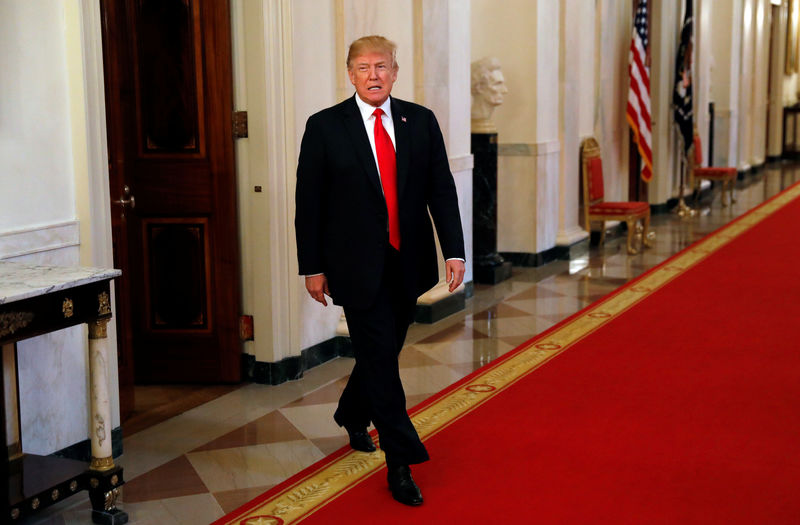 © Reuters. Trump speaks at an opioid summit at the White House in Washington
© Reuters. Trump speaks at an opioid summit at the White House in WashingtonBy Adriana Barrera and Sharay Angulo
MEXICO CITY (Reuters) – Ministers from the United States, Canada and Mexico meet on Monday to wrap up the latest round of NAFTA talks under the shadow of U.S. President Donald Trump’s proposed steep tariffs on steel and aluminum imports.
Trump is expected to finalize the tariffs – 25 percent on steel and 10 percent on aluminum – later in the week, posing a tough challenge for U.S. Trade Representative Robert Lighthizer, Canada’s Foreign Minister Chrystia Freeland and Mexican Economy Minister Ildefonso Guajardo.
The Mexican and Canadian ministers are likely to press Trump’s trade envoy on whether their countries will be excluded from the blanket tariffs.
“I expect it to be front and center” at the meeting, said Kevin Brady, the Republican chairman of the U.S. House of Representatives Ways and Means Committee, which oversees U.S. trade policy.
Officials have so far been evasive when asked how the three nations can continue trying to update the North American Free Trade Agreement at a time when the U.S. president is about to take a highly protectionist measure.
Brady led a delegation of U.S. lawmakers to Mexico City to press officials on the need to conclude the talks, which have unnerved financial markets worried about the possibility that the North American supply chain could be disrupted.
Speaking on Sunday, Brady said all fairly-traded steel should be excluded from the tariffs. U.S. stocks fell sharply on Thursday on fears of a looming trade war after Trump, a Republican, announced the planned tariffs.
‘A BIT MORE TO DO’
The NAFTA talks are going slowly and the Mexico City round – the seventh of eight planned sets of negotiations – produced little of substance.
Eight days of talks in Mexico’s capital failed to make headway on new rules governing the content of products made in North America, which has been one of the most contentious issues in the talks.
The U.S. negotiator charged with overseeing the so-called rules of origin unexpectedly returned to Washington for consultations early on and did not return. Talks on the matter will be rescheduled before the expected next proper NAFTA round in Washington in early April.
Still, Brady said he was impressed with the progress made during the week, emphasizing it was important to finish negotiating a modern, pro-growth agreement that would boost manufacturing and jobs.
U.S. Representative Roger Marshall, a Republican who traveled with Brady to Mexico, said meetings during the week had closed chapters related to chemicals, communications and anti-corruption efforts.
“I am very optimistic,” Marshall told reporters after briefings from U.S. trade officials.
Canada’s chief negotiator Steve Verheul said: “For the week we do have successes we can point (to), but we still have got a bit more to do.”
Dave Solverson, a former president of the Canadian Cattlemen’s Association, said the NAFTA region could not afford a trade war, especially when attempting to renegotiate the 24-year-old trade deal.
Fusion Media or anyone involved with Fusion Media will not accept any liability for loss or damage as a result of reliance on the information including data, quotes, charts and buy/sell signals contained within this website. Please be fully informed regarding the risks and costs associated with trading the financial markets, it is one of the riskiest investment forms possible.
Source: Investing.com




























